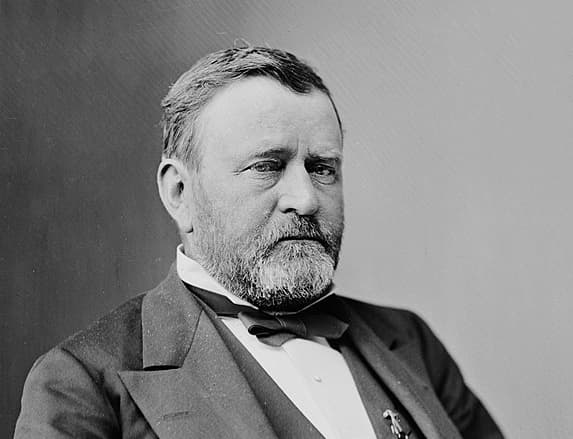A New Appreciation for Ulysses S. Grant Arises When Seeing Others Reneging on Reconstruction
Bordewich’s positive view of the former general adds to a trend among contemporary biographers toward seeing him as a relatively effective president.

‘Klan War: Ulysses S. Grant and the Battle to Save Reconstruction’
By Fergus M. Bordewich
Knopf, 480 pages
In 1868, Reconstruction was in a bad way. Andrew Johnson had reneged on Lincoln’s program of reform, allowing ex-Confederates to resume a reign of terror that was effectively disenfranchising the freedmen. Yet General Grant, in a report to President Johnson, suggested that the South, reconciled to defeat, would welcome former slaves as citizens.
Then, a radical Republican, Carl Schurz, doing his own investigation, showed the South to be a terrorist state, rife with lynchings, rape, bodily mutilation, whippings, and virtually every form of atrocity against Black people that could be imagined.
After taking office in 1869, an embarrassed and chagrined Grant executed a series of enforcement acts meant to crush the Ku Klux Klan and a variety of other secret organizations committed to ending the Black vote and evicting, when not murdering, both white and Black leaders who supported the civil and constitutional rights of the ex-slaves.
At first, Grant’s measures had widespread support in the North and parts of the South, since it was not only Blacks who were intimidated and murdered but whites as well who were forced to tolerate and sometimes made to join violent Klan campaigns for white supremacy.
Near the end of Grant’s first term, though, Northerners began to tire of the efforts on behalf of the freedmen. The predations of white Southern supremacists were thought to have lessened, even as the Republican Party struggled to gain white support in the South as fearful Black voters stayed away from the polls.
Republicans like Schurz began to shift their politics, emphasizing the mistaken belief that the South had been reconstructed and that further efforts on behalf of Black people alienated the white polity that believed African Americans were given special favors in order to keep the Republicans in political office.
Grant’s re-election in 1872 came as something of a surprise, since he won 56 percent of the vote, three percentage points better than his margin of victory in 1868. Yet, as Mr. Bordewich observes, this high point of Grant’s achievement, his crushing of the Klan, ironically led to the defeat of his expectation that the South had indeed accepted the notion of racial equality.
Mr. Bordewich’s positive view of Grant continues a trend among contemporary biographers toward seeing him as a relatively effective president, overturning the Henry Adams and Allan Nevins emphasis on a feckless president, a dolt who named mediocre men to his Cabinet and seem oblivious to the corruption rife in his government.
Even as Schurz tried to minimize Southern barbarity, Grant had data he could not ignore: the hundreds of political murders and tortures. The president pressed on, even while realizing in the last two years of his second term that the continuation of Reconstruction seemed unlikely.
What to make of this new appreciation of Grant? In part, it arises from looking at the evidence other biographers ignored or discounted. In part, it has to do with the consequences of Reconstruction’s failures and dispatching the flimsy arguments against its enforcement that relied mainly on blaming the federal government for exercising coercive power on the states.
Opponents of Reconstruction argued that whites should rule because legislatures dominated by African Americans were corrupt. How corrupt? Mr. Bordewich does not say, though he apparently did not find significant evidence of venality. One might also ask: Were Black officeholders more unscrupulous than white members of state governments, members of Congress, or the Grant administration?
Even Schurz, shortly before he died, admitted that Reconstruction had not ensured the rights of African Americans to vote, though, as Mr. Bordewich points out, Schurz did not acknowledge that his own blindness to Southern revanchism had much to do with the propagation of segregation and the denial of civil rights to the Black populace.
Quite aside from what Mr. Bordewich’s book has to say about Reconstruction is the horrendous record of political violence in this country, much of which seems to have been forgotten in the press that today uses the word “unprecedented” to describe the mounting death threats against officeholders and election workers.
Mr. Rollyson is the author of “American Biography.” His work in progress is “Making the American Presidency: How Biographers Shape History.”

